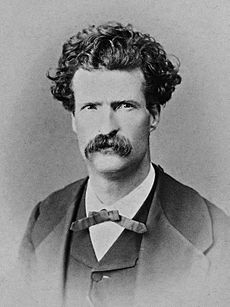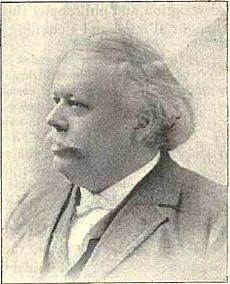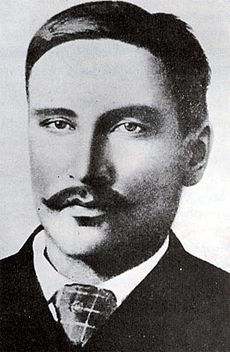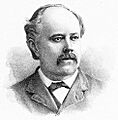Thomas Fitch (politician) facts for kids
Quick facts for kids
Thomas Fitch
|
|
|---|---|
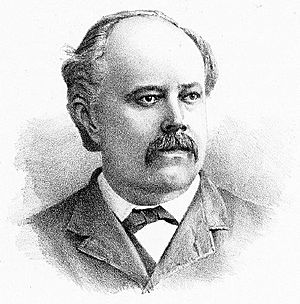 |
|
| Member of the California State Assembly from the 15th district |
|
| In office 1862–1863 |
|
| Delegate to the Nevada Constitutional Convention | |
| In office July 4, 1864 – July 28, 1864 |
|
| Washoe County District Attorney | |
| In office 1865–1866 |
|
| Member of the U.S. House of Representatives from Nevada's at-Large district |
|
| In office March 4, 1869 – March 3, 1871 |
|
| Preceded by | Delos R. Ashley |
| Succeeded by | Charles West Kendall |
| Delegate to the Utah Constitutional Convention | |
| In office February 19, 1872 – March 2, 1872 |
|
| Delegate to the United States Senate from the Utah Territory | |
| In office March 18, 1872 – 1872 |
|
| Arizona Territorial Legislature | |
| In office 1879–1879 |
|
| Personal details | |
| Born | January 27, 1838 New York City |
| Died | November 12, 1923 (aged 85) Decoto, California |
| Resting place | Chapel of the Chimes Memorial Park, Hayward, California |
| Political party | Republican |
| Spouse | Annie M. Shultz |
| Profession | U.S. Congressional Representative; lawyer; writer and newspaper editor; district attorney |
| Signature | |
Thomas Fitch (January 27, 1838 – November 12, 1923) was an American lawyer and politician. He was known for his strong speaking skills. People called him the "silver-tongued orator of the Pacific."
Fitch defended important people in famous legal cases. He defended leaders of The Church of Jesus Christ of Latter-day Saints in 1871 and 1872. He also successfully defended Virgil, Morgan, and Wyatt Earp along with Doc Holliday after the famous Gunfight at the O.K. Corral in 1881.
He wrote for and edited several newspapers. He also held many political jobs. Thomas Fitch was a strong member of the Republican Party. He campaigned for Abraham Lincoln in Nevada. He served in the California State Assembly from 1862 to 1863.
In 1864, he lived in Virginia City, Nevada. There, he edited the Virginia Daily Union newspaper. He became friends with Mark Twain, who said Fitch helped him improve his writing. Fitch was also a delegate to the Nevada and Utah state constitutional conventions. He was a member of the Arizona Territorial Legislature in 1879.
He saw the first rail laid for the Overland Route in Sacramento. He also saw the last rail laid at Promontory Point in Utah. He worked as a lawyer in Nevada, Utah, and Arizona. He moved often between these states. Some people said he was one of the "three great orators" who helped keep California loyal to the Union during the Civil War.
Contents
Early Life and Family
Thomas Fitch was born in New York City on January 27, 1838. His father, also named Thomas, was a merchant. Thomas went to public schools. His family had lived in New England for many generations. One of his ancestors, Sir Thomas Fitch, was a governor of Connecticut when it was a colony.
Thomas Fitch married three times during his life. His first wife was Mary H. Wainright. They married in 1858 in San Francisco, California. They had two sons, Francis (born 1859) and Thomas (born 1862). Mary passed away after giving birth to their second son.
His second wife was Anna Mariska Shultz. They married in 1863 in San Francisco. Anna passed away in 1904. His third wife was Serena (Rena) Dodds. They married on March 28, 1905, in San Bernardino, California.
Moving West and Early Career
In 1855, Thomas Fitch moved to Chicago, Illinois. The next year, 1856, he moved to Milwaukee, Wisconsin. There, he started working as a clerk. In 1859, he became a local editor for the Milwaukee Free Democrat newspaper. He worked there for one year.
In the summer of 1860, he moved to San Francisco, California. When he arrived, he campaigned across California. He supported Abraham Lincoln for U.S. President and Hannibal Hamlin for U.S. Vice President. His efforts were very effective.
He wrote for the San Francisco Gazette and became the editor of the Times. While in San Francisco, he also studied law. He learned law at the firm of Shafter, Heydenfeld & Gould.
In 1862, he moved to El Dorado County, California, in the California foothills. There, he wrote for the Placerville Republican newspaper. He was elected to the California State Assembly to represent the 15th District. He served in this role in 1862 and 1863.
Friendship with Mark Twain
In 1863, Thomas Fitch moved to Nevada. He became the editor of the Virginia Daily Union newspaper. At this time, Samuel Clemens, who wrote as "Mark Twain," was also writing for a Virginia City newspaper called the Territorial Enterprise.
On August 1, 1863, Mark Twain reported that Fitch had challenged Joseph T. Goodman to a duel. Goodman was the editor of the rival newspaper, the Enterprise. Goodman had written something insulting about Fitch. Fitch quickly challenged him to a duel. However, the police stopped the duel before it could happen.
Fitch and his family lived in the same building as Mark Twain in Virginia City. Fitch started his own weekly magazine called The Weekly Occidental. Mark Twain was very interested in this project. Fitch planned to publish a novel in parts, with different writers contributing chapters. The Occidental was published from 1864 to 1865.
Mark Twain later said that Fitch gave him his "first really profitable lesson" in writing. In 1866, Twain gave a lecture. He said that at first, his goal was always to make things funny. Fitch told him that his lecture was "magnificent" and "eloquent." But he also told Twain that he ended a very interesting part with a joke that ruined the serious effect. Fitch taught him to avoid such "anti-climax" in his writing.
Legal and Political Career
Thomas Fitch continued his law studies. In 1864, the Nevada Supreme Court allowed him to practice law. That same year, he was chosen as a delegate from Virginia City for the Nevada State Constitutional Convention. He also campaigned for Abraham Lincoln and Andrew Johnson across Nevada.
In 1865, Fitch moved to Washoe County, Nevada. Soon after, he was appointed as the county district attorney. After his term ended in 1866, he moved to Belmont, Nevada, and continued practicing law.
He was elected to the U.S. House of Representatives as a Republican. He served in the Forty-first Congress from March 4, 1869, to March 3, 1871. During this time, he opened his first law practice.
In December 1869, he spoke against a bill that would change how the Utah Territory was governed. This bill aimed to remove local authority from the territory's residents. Fitch tried to convince Congress to avoid causing more conflict. His opposition to this bill might have cost him votes. He was not reelected in 1870.
In 1870, his wife, Anna, published her first novel. Thomas and Anna also published a book together in 1891.
Later Years and Legacy
After his time in Arizona, Fitch traveled in Europe, the Southern United States, and California for two years. Then he lived in Arizona for four years, working as a lawyer. In 1880, he moved to Minneapolis and started a law partnership.
From 1884, he lived in San Diego and San Francisco County for eight years. In 1891, he defended Ed Tewksbury in a legal case related to the Pleasant Valley War in Arizona. He moved to New York City in 1892, but returned to Arizona in 1893.
In 1894, he briefly moved to Utah when it became a state. He tried to become a United States senator but did not get the nomination. Fitch then returned to Arizona and settled in Phoenix.
Later in his life, he said his speaking skills were influenced by famous orators like Col. E. D. Baker and Thomas Starr King. He also learned from his time with Mark Twain and Joaquin Miller. He was also influenced by his friendships with important figures like Leland Stanford and Collis P. Huntington.
In 1906, he spoke in Phoenix to support Arizona becoming a state along with New Mexico. He lived in San Diego and Honolulu at different times. In 1909, he moved to Los Angeles. There, he became a writer for the Los Angeles Times, a job he held until 1916.
Thomas Fitch passed away on November 12, 1923, in Decoto, California. He was buried in Chapel of the Chimes Cemetery in Hayward, California.
Images for kids
 | Victor J. Glover |
 | Yvonne Cagle |
 | Jeanette Epps |
 | Bernard A. Harris Jr. |


